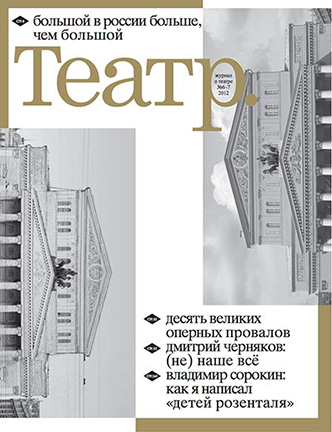On Stage
The Legend. What Is Bolshoi Theatre?
National theatre studies abound in inspired writings about the outstanding figures and famous stagings at Bolshoi Theatre. Theatre. undertook to look into the nature of Bolshoi as a social/cultural entity and engaged an author from the ‘outside’ to write about it. Well-known critic from St. Petersburg comes up with an uncommon and rather ruthless answer to our question.
Protagonist. Legend of the Invisible House
Dimitri Chernyakov is not only the brightest but probably the only one of the Russian forty-year-old directors who managed to make a spectacular career internationally. His scandalous stagings in Russia and the way they fit within the context of musical theatre abroad provide another sad proof that the dividing line between ‘them’ and ‘us’ remains effective and Chernyakov today seems to be rather ‘there’ than ‘here’.
Perspective. Grand Style Obsession
A ghost is haunting Russia. The ghost of the grand style. The eminent theatre scholar and historian of ballet has no doubts that at Bolshoi Theatre this ghost feels quite at home in the productions by Yuri Grigorovich. He also notes that even the advanced operatic directors seemingly striving to evade this ghost finally and quite against their will find themselves in the captivity thereof. Yet it is still nothing but a ghost.
Retrospective. The History of Majestic Flops at the Opera (in 10 chapters)
A clamorous, spectacular and scandalous flop is not uncommon in musical theatre. What is uncommon is an opera that fell through on the first night and decades later became ranked as a masterpiece. Theatre. makes an inventory of such rare occurrences.
Time Zones. Encyclopedia of Pseudo Russian Lifestyle
Theatre. briefly looks into the history of the European public’s early experiences of the Russian operas, specifically in comparison to Wagner and Verdi, Gounod and Massenet, the extent to which these operas were representative of the Russian lifestyle and the general impression they produced upon audiences outside Russia in the XX century.
Scene of Action. Where Do Twenty-Year-Olds Go To in Moscow: Seven chic venues, three cult shows and not just this.
To get a brief respite from the grandeur of the operatic art we decided to figure out what theatre means to the twenty-year-olds, particularly to those who think theatre is basically trash. As a result Theatre. came up with a mini-directory of Moscow theatres: who is arousing interest of the public that leaves home predominantly to enter Facebook or Vkontakte, where do they go and especially why do they choose a particular venue.
Off Stage
Cultural Hero. Anatoli Iksanov: ‘If Scandal Breaks Out a Raw Nerve Must Have Been Hit’
Like many Russian managing directors who, in contrast to their Western counterparts, very seldom have musical or intellectual backgrounds the director of this country’s number one musical theatre Anatoli Iksanov started precisely as a pure administrator. Yet it is precisely Iksanov who has been for many years shaping the company’s artistic policy. Theatre. undertook to find out how one becomes a quartermaster in Russia.
Trend. The Operative Agents
Professionals are unlikely to give an unambiguous answer to the centuries-old question of who is in charge in an opera theatre. Yet it seems clear that, as distinct from the golden age of the opera, a rich-voiced star has ceased to be the key figure on stage. Theatre. attempted to figure out why it is so and how the present-day operatic singer has changed in general.
Outlaying Districts. Small Duplicates of Bolshoi Theatre
Huge as it is, and with all its notorious chain of command and monstrous centralization, Russia stands out for wide variety of aesthetic requirements in different regions. Theatre. undertook to find out how provincial opera theatres become big-timers and why some end up as losers.
Beyond the Stage
Movie Theatre. How Opera Took Over Silver Screen
Much has been written about the motion pictures as the crowning achievement of Gesamtkunstwerk and the most adequate quintessence of what has been written. Theatre. tried to juxtapose the intensity of aesthetic experience of the first audiences of Dolce Vita, Intolerance or Novecento with the effect produced upon the public by the premiere of Ring of the Nibelung.
Society. Walks in the Auditorium
Quite a few new Russian theatre-goers see the recently reconstructed building of Bolshoi Theatre as a posh club with socking great music and plenty of gilt, which gave Theatre. an incentive to recall what theatre manners were like in different countries and in the days gone by as well as to look at how these manners have changed since then.
Excursus. Music Sealed in Stone
Opera houses are by and large conceived by modern tourists as focal urban attractions. But was it always like this? Theatre. undertook to figure out what opera was like as an architectural structure and as a genre in the very first days of its existence.
Yellow Pages
Bolshoi Orchestra Plays Last Farewell
Magazine Theatre. came into possession of previously unknown archive materials designated as ‘Funeral Files’ containing notes made by members of the Bolshoi Orchestra on the score of Frédéric Chopin’s Funeral March (orchestration by Alexander Glazunov) in the period between 1934 and 1981. Theatre historian and archivist Sergei Konayev believes these «marginal notes» can add new details to the history of Bolshoi Theatre.
Text
Vladimir Sorokin, Children of Rosenthal (libretto of Leonid Desyatnikov’s opera)
